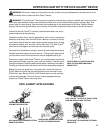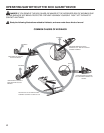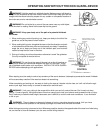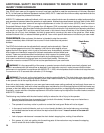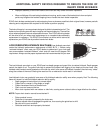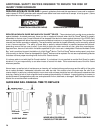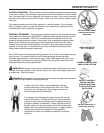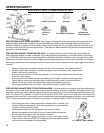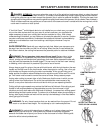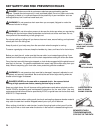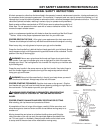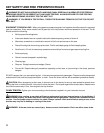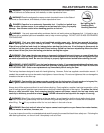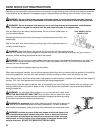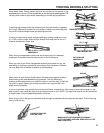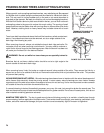
19
KEY SAFETY AND RISK PREVENTION RULES
DANGER! KICKBACK may occur when the nose or tip of the guide bar touches an object, or when the wood
closes in and pinches the saw chain in the cut. Tip contact in some cases may cause a lightning-fast reverse reaction,
kicking the guide bar up and back toward the operator (this is called a rotational kickback). Pinching the saw chain
along the top of the guide bar may push the guide bar rapidly back toward the operator (this is called a linear kickback).
Either of these reactions may cause you to lose control of the saw and come in contact with the moving chain, which
could result in serious or fatal injuries.
IF the Kick Guard
®
anti-kickback device is not installed on your chain saw, you cannot
rely on the other devices built into your saw. As a chain saw user, you must take the
steps necessary to keep your cutting jobs free from accident or injury. With a basic
understanding of kickback, you can reduce or eliminate the element of surprise. Sudden
surprise contributes to accidents. Understand that rotational kickback is preventable by
keeping an unshielded bar nose from touching a solid object, wherever it may be
positioned.
SAFE OPERATION: Stand with your weight on both feet. Adjust your stance so as to
be away from the saw chain and the line of cutting. When the saw is used without the
Kick Guard
®
device, the cutting line becomes the potential path of a rotational kickback.
WARNING! Do not operate a chain saw with one hand! Serious injury to the
operator, helpers, or bystanders may result from one-handed operation. For proper
control, always use two hands when operating a chain saw. Never operate the saw with
only the hand that operates the throttle trigger. This can result in the chain saw “skating”
or skidding, which can result in personal injury due to loss of control.
Always keep a good firm grip on the saw with both hands, with the right hand on the rear
handle and the left hand on the front handle, when the engine is running. Use a firm grip
with thumbs and fingers encircling the chain saw handles. A firm grip will help you to
better position the saw to reduce kickback and to maintain control of the saw. Do not let
go. Two hands must be used to control the saw at all times. Always assure proper
footing when cutting to prevent slips or falls. Make sure that the area in which you are
cutting is free from obstructions. Do not let the unshielded bar nose contact a log,
branch, or any other obstruction which could be hit while you are operating the saw.
Cutting at high engine speeds may reduce the likelihood of kickback. But cutting at part-
throttle or low engine speeds may be preferable to control the chain saw in tight
situations and may also reduce the likelihood of kickback. Increase chain cutting speed
before letting the chain make contact. To reduce risk of kickback when plunge-cutting or
boring, start at part throttle and wait until the saw tip is buried deeply in the wood before
slowly going to full throttle.
WARNING! Cut only those branches that can be reached from the ground. Do not
over-reach or cut above chest height. Do not attempt to cut in awkward positions.
WARNING! Do not cut while standing on a ladder or up in a tree unless you have
been specially trained to do so. Cutting while on a ladder is extremely dangerous
because the ladder can slip and your control of the chain saw is limited. Working aloft
should be left to trained professionals.
DON’T ALLOW TIP
CONTACT
DON’T OPERATE
ONE-HANDED
FIRM TWO-HANDED
GRIP
FIRM ENCIRCLING
GRIP
DO NOT CUT WHILE IN
TREES OR ON LADDERS



